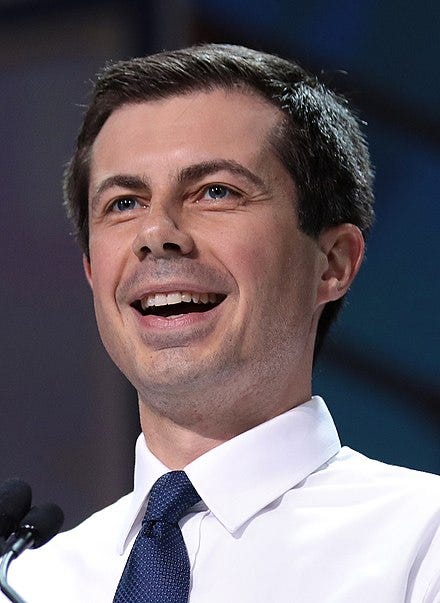Title: Buttigieg's Selection as Transportation Secretary: A New Era
Written on

President-elect Joe Biden is actively assembling his cabinet and administrative team. The latest development involves his initial nomination of a key rival, former South Bend Mayor Pete Buttigieg, for the position of Transportation Secretary. This role places Buttigieg at the forefront of significant policy changes expected under the new administration.
The transportation sector is currently undergoing transformative changes, driven by advancements such as Tesla's initiatives to electrify and automate vehicles, the rise of mobility-as-a-service platforms like Transit, Uber, and Lyft, and the burgeoning internet of things (IoT) that connects various modes of transport. Let’s delve deeper into the background of Mayor Pete.
- Pete Buttigieg’s Journey
On June 16, 2015, Buttigieg, the mayor of a small, left-leaning city in a predominantly conservative Indiana, publicly came out in an article published in the South Bend Tribune:
“…I was well into adulthood before I was prepared to acknowledge the simple fact that I am gay. It took years of struggle and growth for me to recognize that it’s just a fact of life, like having brown hair, and part of who I am.”
Disclosing such personal information in a newspaper is no small feat, particularly for those of us from the Midwest, who typically value privacy.
By the time Buttigieg campaigned for president in 2019-2020, his marriage to Chasten Buttigieg was a focal point of his platform. As the first openly gay presidential candidate, he is poised to become the first LGBTQ cabinet member if confirmed.
Even in 2015, when he shared his coming-out story, Buttigieg demonstrated courage through his actions. A year prior, he had deployed to Afghanistan as a reservist, reflecting on this experience in an article for The Oprah Magazine:
“…Early in my third year as mayor of South Bend, Indiana, in 2014, I found myself sitting down at my desk to write a letter for my family to read in the event that I was killed during my upcoming deployment to Afghanistan…”
Buttigieg’s decision to serve also reflects a pattern of seemingly contradictory yet deeply reasoned choices, such as his enlistment as a Navy Reserve officer in 2009.
Coming from a family with a rich history of military service, including a great uncle who served in WWII, Buttigieg has always felt a connection to the armed forces:
“…As a kid, I had this sense of being connected to the military…”
Buttigieg’s choice to serve is intriguing, given his academic achievements. After graduating magna cum laude from Harvard in 2004, he was known for a compelling anti-war speech that rallied fellow students against President Bush’s military actions. Nonetheless, he recognized the complexity of war, acknowledging the need for military readiness:
“…They remind us of a time when we had to take up arms against another nation, and there may be a day we have to again, but that day isn’t today…”
Buttigieg’s political aspirations began during his time at Harvard, where he sought to understand the nuances of American political philosophy. He was awarded a Rhodes Scholarship to study at Oxford, earning a degree in philosophy, politics, and economics in 2007, followed by a stint at McKinsey & Company.
This impressive background led him to the Navy recruiting office in 2009—a high school valedictorian and Rhodes scholar who had voiced opposition to war.
Buttigieg received his orders on August 28, 2013, reporting to the Navy Operational Support Center in Chicago on February 28, 2014. He served for seven months, primarily tasked with disrupting terrorist financing and transporting his commander in high-risk areas.
- The Political Aspirant
In the year Buttigieg graduated as valedictorian, he also won a prestigious essay contest and was selected for a youth program in the U.S. Senate. At Harvard, he became president of the Student Advisory Committee at the Institute of Politics, all while managing a rigorous academic workload.
He interned for Jill Long Thompson during her congressional campaign in 2002 and subsequently contributed to John Kerry’s presidential campaign in 2004, Joe Donnelly’s congressional bid in 2006, and Jill Long’s gubernatorial campaign in 2008. In 2010, he ran for Indiana state treasurer but lost.
However, he rebounded in 2011, winning 74% of the vote to become the mayor of South Bend and was re-elected in 2015 with over 80% support.
Buttigieg briefly considered a bid to chair the Democratic National Committee in 2017 but withdrew as Tom Perez gained traction. In early 2019, he announced his presidential run, achieving notable successes in the primaries before endorsing Biden after withdrawing.
Buttigieg identifies as a progressive who believes in democratic capitalism:
“…I think the word ‘socialism’ has largely lost its meaning in American politics because it has been used by the right to describe pretty much anything they disagree with…”
He raises concerns about the relationship between wealth and political power, highlighting issues of inequality and regulatory capture within American democracy.
- The Role of Transportation Secretary
While the title of Transportation Secretary may seem mundane compared to other cabinet positions, it carries significant responsibility. Biden’s economic vision emphasizes job creation and community rebuilding, positioning Buttigieg to wield considerable influence over economic policy.
Transportation plays a vital role in addressing climate change, the sector being a major contributor to greenhouse gas emissions. Tesla’s commitment to electrifying vehicles underscores the urgency of this transition.
Moreover, Buttigieg will be instrumental in advancing autonomous driving initiatives and the shift towards mobility-as-a-service, reflecting a broader societal trend away from car ownership towards shared transportation solutions.
The rapid advancement of connected technologies and blockchain also promises to reshape transportation and economic landscapes.
These pivotal changes in transportation present Buttigieg with a unique opportunity to make a lasting impact. For someone passionate about policy innovation, this role is an exciting prospect, and the nation should be optimistic about having such a dynamic leader in this crucial position.